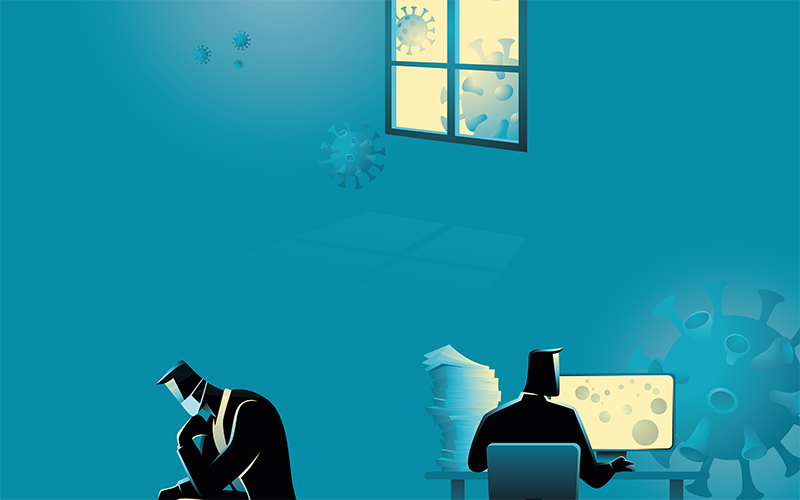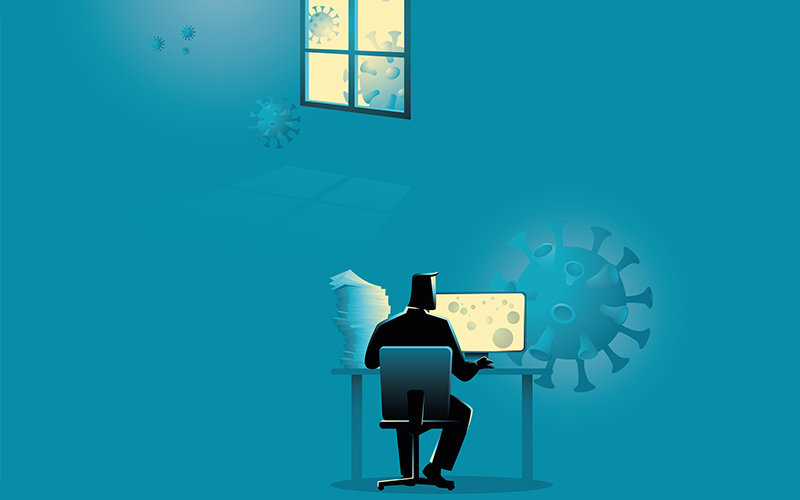Last autumn Specialist Scientific Lead Azuma Kalu wrote an article on pandemic pressures in the lab. A year on, he revisits the subject.

At the start of the pandemic, the priority given to employee safety and wellbeing led to the changes in workplaces.
The emphasis on remote working meant that those who could work from home were supported to do so. Additionally, those who were deemed to be vulnerable were required to self-isolate.
The reduced number of staff meant that pressure was placed on the available staff to cover the shifts, with the resultant impact on their health and wellbeing.

Bearing the burden
In clinical laboratories, most of the jobs with scope for remote working are the more senior roles that involve result reporting or documentation and could primarily be performed remotely on computers. While the better-paid managers have been able to work from home, making savings on daily transportation cost, low-level staff, such as medical laboratory assistants, who have to receive and book in specimen requests, and the junior scientists who perform analyses daily and cover the out-of-hours services, all of whose jobs require them to be physically present, have had to bear most of the burdens of keeping the services running. There has also been the added task of scanning and emailing of results and worksheets ready for reporting, performed by the junior scientists for the more senior scientists working from home.
As the pandemic restrictions are lifted, with the expectation that services will begin to return to normal, there is now a resistance from many senior scientists and managers to return to office working. Certainly, there are administrative roles that can be performed remotely, but the argument for a senior scientist whose duties, among others, requires training and mentorship of junior staff to continue to resist a return to the laboratory rests on shaky grounds. For many junior staff, the physical presence of their senior colleagues is a demonstration of commitment to the wellbeing of the entire workforce, and this comes from the knowledge that face-to-face contact creates rapport and trust, while training and mentorship is best achieved when you can physically build a relationship.
Long-term remote working may have some negative effects on the delivery of training, especially for new or inexperienced members of staff, and thus impact on career development. Also, it has been known to extend the workday, blur the boundaries between work–life balance, and has the potential to increase stress thresholds and ultimately have a negative impact on mental wellbeing. Therefore, for those roles that are adaptable to remote working, organisations should strive to strike a middle ground and adopt a hybrid approach, which combines remote working days and office days as a more sustainable new normal.
The challenge
The pandemic has brought untold hardship to many people and changed their lives forever. Many staff have lost loved ones and, in some cases, were not able to say goodbye. Some have family members who have lost their jobs or their job prospects. Financial worries have also ranked high as one of the consequences of the economic stagnation occasioned by the pandemic. Equally, there are still some who have endured significant isolation for these long months and cannot bear it any longer. For each of these people, there is a void, a pain, an anguish, which can easily morph into a psychological trauma. It is always easy to suppress such feelings and the longer it is bottled up, the more it develops into a more serious condition. Each of these people comes into the laboratory burdened with worries and any additional stress can easily exacerbate their situation.

As expected, the sample numbers are steadily building up again and staff shortage is becoming a recurrent denominator. Many laboratories are already reviewing their COVID-19 policies to make it more adaptable and applicable to their current circumstances, however, any anticipated improvement will be handicapped by non-availability of staff. One of the things that might be helpful to the long-term sustenance of the laboratory is for the managers to carry out a skill mix review. This can go a long way in improving the resilience of the laboratory as we come out of the pandemic.
Keeping up with the routine tasks associated with quality management and continuous accreditation are the usual casualties whenever staffing levels are low and this has been prominently shown to be the case during the pandemic. As sample numbers begin to increase, managers face a difficult choice of meeting the service obligations with the available staff without compromising their commitments to their laboratories’ continuous accreditation requirements.
As more staff gradually return to the laboratory to work, organisations should implement better employee engagement practices, as these promote more openness and better communication, both of which are critical to the success of any organisation. Also, managers should of necessity begin to provide support for staff affected adversely during the pandemic to undergo mental health assessment. This will promote a positive mental health attitude in the team and lead to a healthier, more creative, more productive, and responsive workforce.
The opportunities
The pandemic has offered many scientists the opportunity to learn new skills, cross-train in different specialities and develop new behaviours that have improved the services their laboratories offer. E-learning courses may have been available prior to the pandemic, but there was always preference for in-person workshops and seminars, however, that has now changed during the pandemic with many staff attending virtual training and e-learning courses. This trend is going to be the new normal and an integral component of staff training and development. This presents organisations an opportunity to reduce their employee training costs.
Access to advanced technology has also promoted flexibility in working patterns for those staff whose job roles lend themselves to remote working. For such staff, having the option to work some days from home has made a lot of difference to their personal lives and improved their productivity.
Azuma Kalu is a Specialist Scientific Lead in Specialised Clinical Chemistry at Sheffield Teaching Hospitals NHS Foundation Trust. To listen to Azuma discuss mental health and workplace pressures, listen to episode 11 of the podcast IBMSpod, available soon at ibms.org/resources/podcasts/ibmspod
Image credit | Shutterstock
